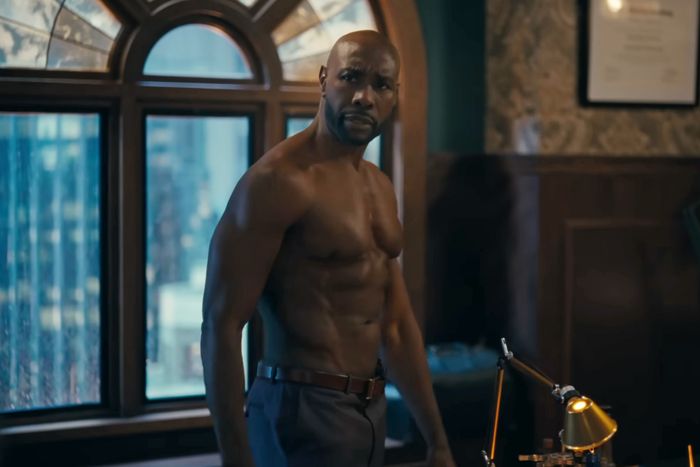
Are you paying attention to this man’s Watson press tour? Because you should be.
Photo: CBS
When I was still in girlhood, my mind was blown to learn what kind of man white women imagined when using the descriptor “tall, dark, and handsome.” Wait, they’re just thinking of a strong-jawed guy who isn’t blond? I can’t relate. For my entire life, the epitome of tall, dark, and handsome has been Morris Chestnut, an actor who looks as if he was sculpted from marble by the hands of a loving and generous god.
He first captured my attention with his breakthrough role in John Singleton’s 1991 drama Boyz n the Hood. Then he was Lance Sullivan in the 1999 launch of The Best Man franchise. (If that role had been played by someone with even an ounce less charisma and onscreen presence, the character — a former rake who suddenly has concerns over his fiancée’s purity — would fall apart.) He appeared in a flurry of television parts in the aughts and 2010s — Nurse Jackie, ER, The Resident, Rosewood — but I always come back to his role in the 2001 film Two Can Play That Game, a war-of-the-sexes romantic comedy starring Vivica A. Fox as a high-powered professional woman who, in fourth-wall-breaking asides, comments on the tricks men play and how to combat them.
My mother, grandmother, and I wore that DVD out watching Fox’s character, Shanté Smith, try to outgame her boyfriend, the similarly accomplished attorney Keith Fenton (Chestnut). The movie combines cultural specificity, raunchiness, heat, a little sweetness, and a great cast (Mo’Nique and Tamala Jones are highlights) into a delectable cocktail. But its greatest moments capture what has ultimately propelled Chestnut’s career-long position as a sex symbol: the particular way he looks at a woman. Not just with lascivious desire, but with genuine respect — a combination that gives the impression that he truly loves being around us, whether in platonic or romantic settings.
And so here I am, in 2025, watching Watson, the CBS series in which Chestnut plays — you guessed it — the hottest version of Dr. John Watson this side of Lucy Liu’s Elementary. The series was created by Craig Sweeny, who worked on Liu’s silly but surprisingly emotionally attuned Sherlock Holmes-inspired procedural. Watson is clearly aiming for a similar sentiment: It opens on the apparent death of Sherlock Holmes and Moriarty at Reichenbach Falls, which Chestnut’s Watson witnesses. He goes as far as to jump in the raging waters to save his friend but is left with a traumatic brain injury. In his will, Sherlock left his companion wealth and a medical clinic to run as he sees fit. So half a year later, Watson is living in Pittsburgh, navigating the ripple effects of his brain injury, making peace with the current state of his relationship with ex-wife Mary Morstan (Rochelle Aytes), and running the clinic with a quippy set of underlings who are doctors who also do detective work.
Does Watson take itself a touch too seriously in crucial moments of its premiere? Yes. Do characters rush through wild diagnoses, medical jargon, and overcooked comebacks? Yes. Is the idea of casting Randall Park as Moriarty and asking him to play intimidating the height of comedy? You tell me. But I am curious to witness how it all shapes up and whether it can calibrate its own sweetness and curiosity into a worthwhile brain-smoothing excursion.
Let’s be honest: What’s keeping me engaged with the series is Chestnut, who is clearly having fun finding the cunning in a character like Watson. It helps that 31 minutes into the first episode, the writers find an excuse for Chestnut to take his shirt off. When I say I almost gasped looking at this 56-year-old man with abs upon abs, so cut it looks like touching his edges would draw blood, I am not being hyperbolic. But what’s even more alluring is the regard and care behind Watson’s gaze, specifically when aimed at his ex-wife. Their relationship isn’t acrimonious, but it’s weighted with history, a dynamic that Chestnut easily communicates by simply holding eye contact with the authenticity of a real movie star.
Beyond the show itself, the press tour for Watson has been a cornucopia of pleasures. Whether Chestnut is appearing on The Late Show With Stephen Colbert, sipping his branded bourbon and speaking about his 30-year marriage, or joking on CBS Mornings with a relaxed demeanor that communicates he’s not new to this but true to this, a few things become apparent. Chestnut is great at working a room, rattling off anecdotes with aplomb and oozing romanticism. And he can wear the hell out of a great outfit; his stylist J. Bolin knows what he’s doing with this cognac-brown leather suit and crisp white turtleneck combo.
Chestnut is cheeky online too, finding the fawning he receives a funny perk of being in the public eye. His Instagram posts in particular speak to an awareness of the iconography he’s created for Black audiences, whether they are clips from work early in his career or beckoning Reels of his sex appeal today. (There is no doubt as to what the first three seconds of this video are about.) Chestnut understands reality as well as I do: Hot men come and go in Hollywood, but only some of them thrive long enough to make a “medical drama with detective elements” feel like the sexiest thing on television.





